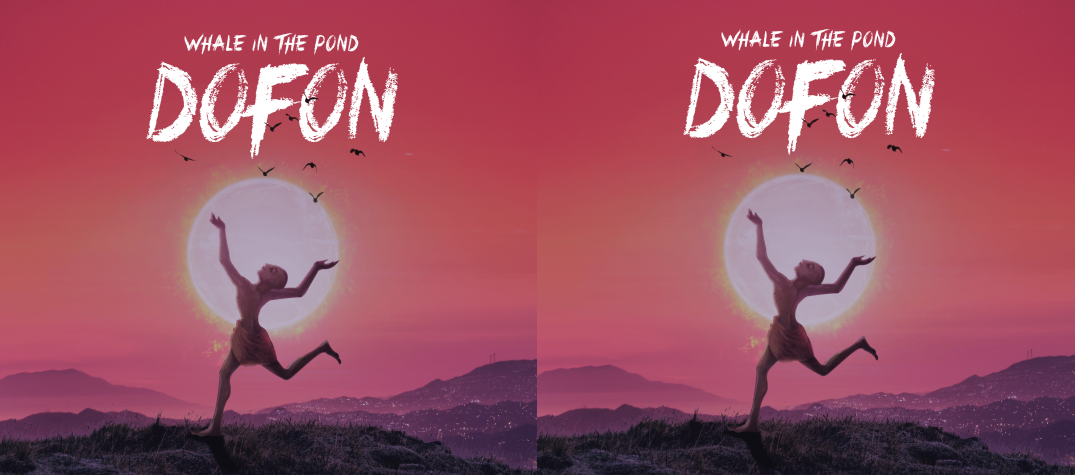The cover art of a music album summarises its essence. When it depicts a mad man dancing in ecstasy with a setting sun in the background just prior to his death, it’s a real jolter.
Especially when that album’s name is ‘Dofon’, meaning ‘burial’ in Bengali. Such literal morbidity is the second offering by Kolkata based dream-folk band Whale in the Pond. If the mad man symbolises the human race, then we are indeed dancing in capitalistic ecstasy at the shores of extinction.
The six-track ‘Dofon’ was birthed when Sourjyo Sinha, the songwriter, was singed by a heatwave last year. It drove home the point that climate change, at the stage it is, could be irreversible. Instances like wildfires in Australia, the Amazon rainforest, cyclone Amphan in India, melting ice-sheets in Greenland and the terrifying COVID-19 pandemic only strengthen such pessimism.
Though the songs were composed before the calamity of 2020 struck, it isn’t surprising that a concept album about ushering in the end of the world comes at such a time. The underlying premise is that we have committed too many atrocities against nature and our time is up.
Impending global doom comes packaged in two songs – ‘The Night’s End’ and ‘Kite/Loon’. The former is a beautiful buttress for childhood lullabies. At the backdrop of soft acoustic music brimming with the throaty exuberance of a melodica, a mother tells her child to sleep till morning as it’s going to be night’s end soon, but what it hides between the lines is the inevitable truth of death and annihilation. Is this the message that we will be passing on to our future generations, knowing that we are inching closer to ‘Judgment Day’ with each passing year?
The latter simply reminisces about the pretty things in the world that bring us joy that won’t exist for much longer. Poignantly, it reflects various activities that we miss while being locked down in our own homes.
Rampant destruction of Nature sometimes raises outcries, but do we ever really consider what it goes through? Do we ponder how a tree feels when it is cut in half or burns with its entire clan in a forest fire? Or do we mourn the ocean fish who suffocate in plastic bags? ‘Where is your Heart?’ becomes the mouthpiece of Nature, asking us about the whereabouts of our lost humanity.
‘Nova’, however, is where the fireworks explode. It narrates the obliteration of Earth and all life forms due to a supernova – the last stage of a star (the Sun) when it explodes. The music conjures up a carnival lit with a million red and yellow lights, flickering on and off. It then warps into the groggy, dazed after-effect of a massive blow which shocks the senses.
Such multi-hued soundscapes are possible due to the other band members – multi-instrumentalists Deep Phoenix, Sagnik Samaddar and Shireen Ghosh. Usually though, the music is soothing, buoyed by twinkling notes, warm piano chords and gentle jangle of guitars. The professional sheen of the impeccably produced record does not reveal that Shireen recorded it in a bedroom and mixed it DIY style.
Also read: Electronic Music Meets Fantasy Bharatnatyam Opera: Astral Explorations With Murthovic
The album finds its political peak in ‘Aaij Bhagle Kalke Amra Nai’. Images of protesting students being beaten up and silenced through the threat of violence flare up in the lyrics of this Sylheti (a dialect of Bengali) song. Incidentally, its presence makes ‘Dofon’ the only English-Sylheti album ever made.
The song narrates the bloody killing of 11 people in Silchar in the early 1960s. The Sylheti-speaking rioters were protesting against the imposition of Assamese as the official language. This finds parallels today where certain sections of the population face imminent identity loss with erosion of their lands and sense of belonging. Such suppression by the government and its need to form a single nationalistic narrative also paints a contemporary picture at the backdrop of resistance against the Citizenship Amendment Act and the National Register of Citizens.
But everything is overshadowed by the eeriness of the title track. Played out by a mandolin on a Bengali folk format, the music is minimal. Sickly silence, hair-raising scratches, muffled voices and ghostly knocks send cold shivers down the spine.
The ominously repeated chants of ‘dhukte dao’ (let me in) seem to echo the unheard pleas of nearly half a million people who have died of coronavirus. The listener confronts the greatest fear at the knock of death and screams of the living dead.
Finally, a wall of sound envelopes everything to end with a thud, as if the coffin lid is shut – leaving behind silence and lingering static that can be heard in one’s ear after the sudden end of sound. The grand music of life is cut off.
Clocking at 24 minutes, Dofon’s best quality is its ability to deceive. A dreamy album that seems to be about floating with butterflies and swimming in strawberry syrup, it is actually a dark ride to the end of time where the apocalypse waits with a black smile.

